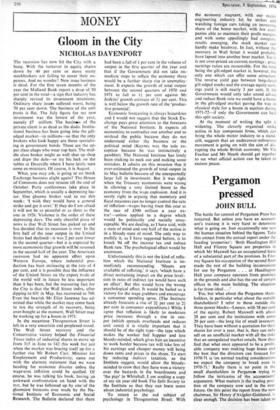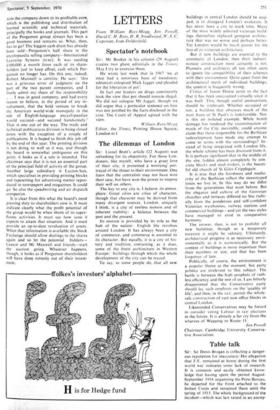Pergamon pressed
JOHN BULL
The battle for control of Pergamon Press has restarted. But unless you have an account- ant's training it is very hard to determine what is going on. Just occasionally one sees the human situation behind the figures. Take this extract from the annual report under the heading 'properties': 'Both Headington Hill Hall and Fitzroy Square are properties in which Mr Maxwell has an occupational lease of a substantial part of the premises. In Fitz- roy Square his occupation of the second floor made the rest of the building inconvenient for use by Pergamon . . . at Headington Hall your company operates from premises in the grounds and also has the use of certain offices in the main building. The situation The battle for control of Pergamon Press has restarted. But unless you have an account- ant's training it is very hard to determine what is going on. Just occasionally one sees the human situation behind the figures. Take this extract from the annual report under the heading 'properties': 'Both Headington Hill Hall and Fitzroy Square are properties in which Mr Maxwell has an occupational lease of a substantial part of the premises. In Fitz- roy Square his occupation of the second floor made the rest of the building inconvenient for use by Pergamon . . . at Headington Hall your company operates from premises in the grounds and also has the use of certain offices in the main building. The situation is far from ideal ...' -
Yes, but what about the Pergamon share- holders, in particular what about the outside shareholders? I refer to those outside the three power blocks—Leasco, with 38 per cent of the equity, Robert Maxwell with about 28 per cent and the institutions with some 20 per cent—the long list of small investors. They have been without a quotation for their shares for over a year, that is, they can only sell on an unofficial market with all the risks that an unregulated market entails. Now they find that what once appeared to be a profit- able company was making huge losses and the best that the directors can forecast for 1970-71 is 'on normal trading considerations we expect the company to break even in 1970-71.' Really there is no point in the small shareholders in Pergamon trying to follow the intricasies of the accountants' arguments. What matters is the trading posi- tion of the company now and in the near future. On this point the report from the new chairman, Sir Henry d'Avigdor-Goldsmid, is clear enough. The decision has been taken to trim the company down to its profitable core, which is the publishing and distribution of learned scientific and technical materials, principally the books and journals. This part of the Pergamon group always has been a good business and remains so. What, then, has to go? The biggest cash drain has already been sold—Pergamon's half share in the encylopaedia selling company—International Learning Systems (u.sc). It was needing £100,000 a month from each of its share- holders just to keep afloat, cash which Per- gamon no longer has. On this one, indeed, Robert Maxwell is contrite. He says: 'this was a grievous error of judgment on the part of the two parent companies, and I freely admit my share of the responsibility . I was in good company, and had every reason to believe, in the period of my in- volvement, that the bold venture to break the American world-wide monopoly in the sale of English-language encyclopaedias would succeed—and succeed handsomely.' That is one out of the way. The trade and technical publicatioas division is being closed down with the exception of a couple of publications. It is hoped to finish this job off by the end of this year. The printing division is not doing so well as it was, and though the board is somewhat ambiguous on this point, it looks as if a sale is intended. The chairman says that it is not an essential part of the principal field of activity of the group. Another large subsidiary is Layton-Sun, which specialises in providing printing blocks and typesetting for advertising matter repro- duced in newspapers and magazines. It could go. So also the,speedwriting and air dispatch companies.
It is clear from this what the board's most pressing duty to shareholders now is. It must indicate clearly what the profit potential of the group would be when shorn of its super- fluous activities. It must say how soon it expects to attain that situation. And it must provide an up-to-date revaluation of assets. When that information is available the Stock Exchange should allow dealings in the shares again and so let the potential bidders— Lease° and Mr Maxwell and friends—start the auction going. Whatever happens, though, it looks as if Pergamon shareholders will have done rottenly out of their invest- ment.
ffolkes's investors' alphabet
H is for Hedge fund































 Previous page
Previous page